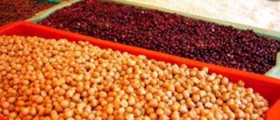
Eggplant is a plant of the family Solanaceae. The edible part of the plant is its fruit, also called the eggplant. This plant is native to India and closely related to the tomato and potato. It is also known under the names aubergine, melongene, brinjal or guinea squash. This annual plant has a fleshy fruit that is botanically classified as a berry. It is dark purple in color and has a meaty texture. The seeds of the plant are also edible, but they are bitter in taste, owing to the nicotinoid alkaloids found in them. Eggplant is known for its health beneficial properties and has very rich nutritional profile.
Nutritional information about eggplant
One cup of boiled eggplant with salt contains about 99 grams. This portion contains only 33 calories and about 237mg of sodium. Eggplants are very low in saturated fat and cholesterol. However, they contain some other important ingredients in very large quantities. For example, this portion of eggplant contains enough dietary fiber to satisfy 10% of recommended daily allowance (RDA) for this nutrient. It also satisfies 5% of RDA for Thiamin, 4% of RDA for vitamin K and vitamin B6, as well as 6% of RDA for Manganese.Health benefits of eggplant
In addition to vitamins and minerals, eggplant contains phytonutrients such as caffeic and chlorogenic acid, and flavonoids, such as nasunin. Nasunin, found in the skin of the eggplant, is one of the most powerful antioxidants that help to protect cell membranes from damage. Antioxidants are important for prevention of various severe diseases including coronary heart disease and certain types of cancer.
Cardio Benefits
Eggplant is also known to lower the level of bad cholesterol in the blood and increase the blood flow. Eggplant also contains iron-chelating properties; it lessens free radical damage in joints, and therefore lowers the risk of heart disease, cancer and rheumatoid arthritis.
It Helps Against Type 2 Diabetes
Eggplant is also beneficial for people suffering from type 2 diabetes. This food is high in fiber and low in soluble carbohydrates and helps to control glucose absorption and reduce high blood pressure. This plant has a low glycemic index of 15.
How To Use Eggplant and Who Shouldn't Use it
However, this food isn’t suitable for individuals suffering from kidney and gallbladder problems. This food contains high amounts of oxalates which are harmful to people with kidney stones or gallstones. Eggplant is sometimes used as a meat substitute but since it is very low in proteins, people should always eat it with a source of protein. For example, eggplant can be combined with lentils, cheese or yogurt.

















Your thoughts on this
Loading...